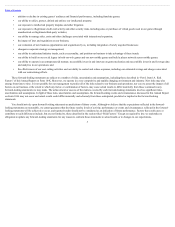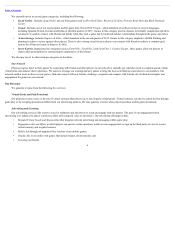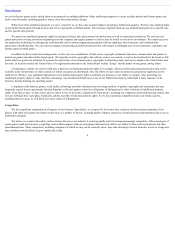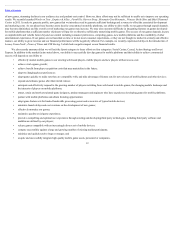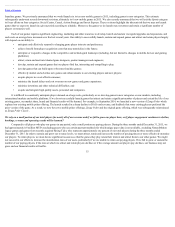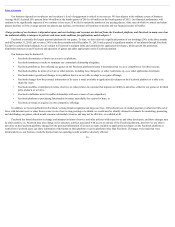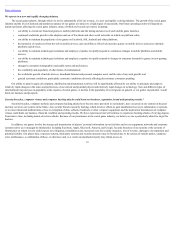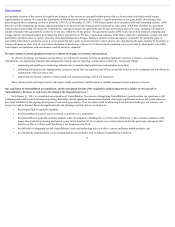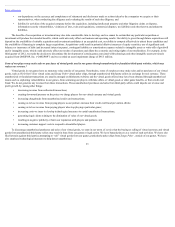Zynga 2015 Annual Report Download - page 16
Download and view the complete annual report
Please find page 16 of the 2015 Zynga annual report below. You can navigate through the pages in the report by either clicking on the pages listed below, or by using the keyword search tool below to find specific information within the annual report.
Table of Contents
These and other uncertainties make it difficult to know whether we will succeed in continuing to develop successful mobile games and launch these games in
accordance with our financial plan. If we do not succeed in doing so, our business will suffer.
Moreover, our mobile games generally monetize at a lower rate than our web-based games and we may not be successful in our efforts to increase our
monetization from mobile games. If we are unable to offset the decline in our web-based games with bookings from our mobile games, our revenue and our
financial performance will suffer.
We are also a relatively new entrant in the mobile game market and, as a result have a relatively short history in developing and launching mobile games. As
a result of this we may have difficulty predicting the development schedule of a new game and forecasting bookings for a game. If launches are delayed and we are
unable to monetize mobile games in the manner that we forecast, our ability to grow revenue and our financial performance will be negatively impacted.
Wemustcontinuetolaunch,innovateandenhancegamesthatplayerslikeandattractandretainasignificantnumberofplayersinordertogrowourrevenue
andsustainourcompetitiveposition.*
We previously announced that we would launch six to ten new mobile games in 2015, including games in new categories. This estimate subsequently
underwent several downward revisions, ultimately to 6 new mobile games in 2015. We also recently announced during our first quarter of 2015 earnings call that
we decided to exit the Sports category to focus efforts on four categories: Social Casino, Casual, Action Strategy and Invest Express. These revisions highlight the
inherent risk that we may not launch games that we expect to launch in a given period according to schedule. Moreover, the games we do launch may not attract
and retain a significant number of players or monetize well. If we do not launch games on schedule or our games do not monetize well, our business, revenue,
bookings and profits will be negatively impacted.
Ifourtopgamesdonotmaintaintheirpopularity,ourresultsofoperationscouldbeharmed.
In addition to creating new games that are attractive to a significant number of players, we must extend the life of our existing games, in particular our most
successful games. Historically, we have depended on a small number of games for a majority of our revenue and we expect that this dependency will continue for
the foreseeable future. Our existing games compete with our new offerings and the offerings of our competitors. Traditionally, bookings from existing games
decline over time. For a game to remain popular, we must constantly enhance, expand or upgrade the game with new features that players find attractive. Increased
competition can result in increasing player acquisition and retention costs. Constant game enhancement requires the investment of significant resources, particularly
with older games, and such costs on average have increased. We may not be able to successfully enhance, expand or upgrade our current games. Any reduction in
the number of players of our most popular games, any decrease in the popularity of our games or social games in general, any breach of game-related security or
prolonged server interruption, any loss of rights to any intellectual property underlying such games, or any other adverse developments relating to our most popular
games, could harm our results of operations.
Ourbusinessisintenselycompetitiveand“hit”driven.Ifwedonotdeliver“hit”productsandservices,orifconsumerspreferourcompetitors’productsor
servicesoverourown,ouroperatingresultscouldsuffer.
Competition in our industry is intense. Many new games are introduced in each major industry segment (mobile, web, and PC free-to-download), but only a
relatively small number of “hit” titles account for a significant portion of total revenue in each segment. Our competitors range from large established companies to
emerging start-ups, and we expect new competitors to continue to emerge throughout the world. If our competitors develop and market more successful products or
services, offer competitive products or services at lower price points or based on payment models perceived as offering a better value proposition, or if we do not
continue to develop consistently high-quality and well-received products and services, our revenue, margins, and profitability will decline.
13


